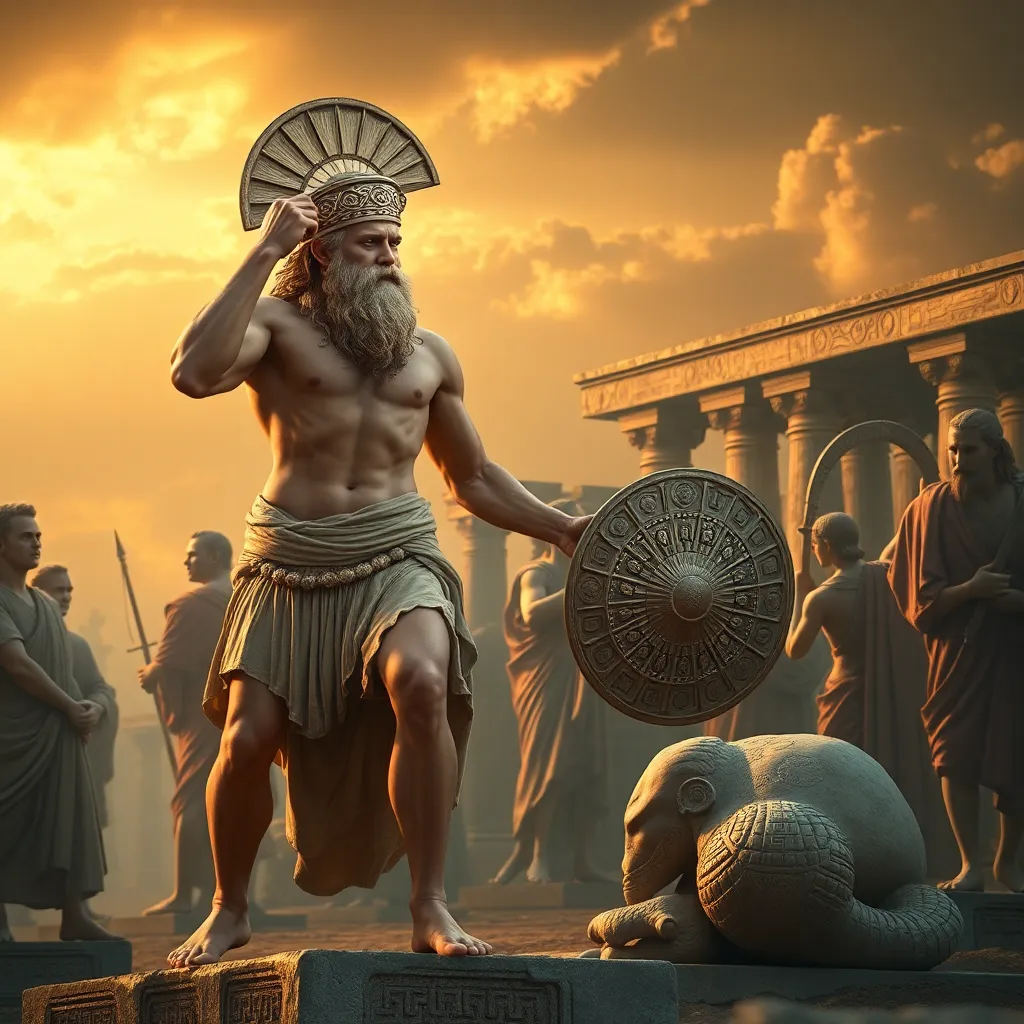The Cultural Significance of Heracles in Ancient Festivals
I. Introduction
Heracles, known in Roman mythology as Hercules, stands as one of the most celebrated figures in ancient Greek mythology. Renowned for his incredible strength and heroic feats, Heracles embodies the ideals of bravery, perseverance, and the human spirit’s resilience against overwhelming odds. His myths have transcended time, influencing various aspects of culture, art, and literature.
In ancient Greek culture, festivals played a crucial role in community life, serving as occasions for religious worship, entertainment, and social cohesion. These celebrations not only honored the gods but also reinforced local identities and communal bonds. This article will explore the significant role of Heracles in these festivities, highlighting how his presence shaped ancient Greek traditions and community identities.
II. The Mythology of Heracles
Heracles’ mythology is rich and varied, with origins tracing back to the hero’s birth. He was the son of Zeus and Alcmene, destined for greatness but also burdened with challenges. His life is marked by the famous Twelve Labors, tasks that included slaying the Nemean Lion, capturing the Golden Hind, and retrieving the apples of the Hesperides. Each labor not only showcases his strength but also his cleverness and determination.
As a symbol of strength and heroism, Heracles serves as an archetype for bravery in the face of adversity. His journeys often reflect the struggles of humanity, aligning him closely with the gods, particularly Zeus, who both aided and challenged him throughout his life. This complex relationship highlights themes of divine intervention and the struggles of mortals seeking approval from the gods.
III. Heracles in Ancient Greek Festivals
Heracles was honored in various festivals across Greece, with some of the most notable being:
- The Olympic Games: Established in 776 BC, these games included events dedicated to Heracles, reflecting his importance as a divine patron of athletes.
- The Heracleia: Celebrated in honor of Heracles, these festivals featured athletic competitions, sacrifices, and theatrical performances that recounted his legendary feats.
The athletic competitions were central to these festivals, serving as a tribute to Heracles’ physical prowess. Events would include wrestling, boxing, and chariot racing, all of which were designed to glorify strength, skill, and endurance. Rituals often involved sacrifices to Heracles, seeking his favor and blessing for competitors.
IV. Heracles and Community Identity
Heracles played a vital role as a unifying figure for various city-states in ancient Greece. His myths and festivals fostered a sense of shared identity and pride among the people, transcending local rivalries. The celebration of Heracles helped to reinforce local traditions and customs, linking communities through common narratives and shared heritage.
Festivals dedicated to Heracles were not only religious observances but also opportunities for social bonding. They created a space for citizens to come together, celebrate their shared values, and strengthen communal ties. These gatherings often included feasting, storytelling, and performances that celebrated the hero’s exploits, thereby reinforcing social cohesion.
V. Artistic Representations of Heracles
Heracles has been a prominent figure in ancient art and literature, depicted in numerous forms, including pottery, sculptures, and theater. These artistic representations often emphasized his physicality and heroic deeds, capturing the imagination of audiences both in antiquity and beyond.
The influence of these depictions on festival celebrations is significant. For instance, theatrical performances during festivals often reenacted Heracles’ myths, blending art with ritual and engaging the community in shared narratives. This artistic legacy extends to visual arts, where Heracles is portrayed in various forms, from vase paintings to monumental sculptures, symbolizing the hero’s enduring impact on Greek culture.
VI. The Role of Myth in Festival Narratives
Myths of Heracles were intricately woven into the fabric of festival practices. Stories of his challenges and triumphs served as moral lessons, providing educational value to participants. Festivals became opportunities to recount these tales, fostering a deeper understanding of courage, sacrifice, and resilience among attendees.
The interplay between myth and contemporary events during festivals often highlighted the relevance of Heracles’ stories to the lives of the participants. By invoking his narratives, communities could draw parallels between their struggles and those faced by the hero, reinforcing the idea that the spirit of Heracles lived on in their actions and aspirations.
VII. Comparisons with Other Mythological Figures
While Heracles shares similarities with other heroes in Greek mythology, such as Achilles and Perseus, he is unique in his portrayal of strength coupled with vulnerability. Unlike Achilles, whose story often centers around themes of glory and tragedy, Heracles’ narrative emphasizes redemption and the human experience of overcoming hardship.
Other mythological figures also played significant roles in ancient festivals, but few matched the widespread appeal and enduring legacy of Heracles. His unique position as a demigod who navigated the realms of both mortals and gods allowed him to resonate with a broader audience, making him a central figure in the pantheon of Greek mythology.
VIII. Conclusion
In conclusion, Heracles embodies a rich tapestry of cultural significance in ancient Greek festivals. His myths not only provided entertainment but also served as a means of reinforcing community identity and social bonds. The legacy of Heracles continues to influence modern interpretations of ancient culture, reminding us of the power of mythology in understanding human experiences and societal values.
As we reflect on the importance of Heracles in ancient festivals, we recognize the enduring nature of these narratives in shaping cultural practices and celebrations. The stories of Heracles will continue to inspire, illustrating the timeless themes of strength, resilience, and the human spirit.




